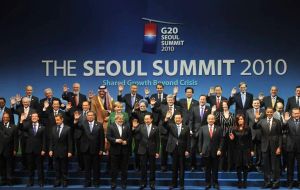MercoPress. South Atlantic News Agency
G20 agrees on “indicative guidelines” for imbalances and hopes for the best
 See you again in France next year
See you again in France next year Leaders of the Group of 20 (G20) member nations meeting in Korea reached a vague compromise Friday on currency and trade issues, calling for a workable resolution for the next G20 summit in France, slated for November next year.
In the Seoul Declaration released following the two-day G20 Seoul Summit, the participating heads of state agreed that “indicative guidelines” on current account balances will be initiated and undertaken in due course.
The declaration calls for an action plan under which they will call on their framework working group, with technical support from the IMF, to develop numerical guidelines, with the progress to be discussed by finance ministers in the first half of 2011, according to the communiqué.
Although the agreement is seen as progress as they set imbalance guidelines, many still doubt the feasibility of the communiqué as it is too vague and unbinding with no numerical targets.
The U.S., supported by Korea, has called for a numerical limit ― but this move has met a strong backlash from countries such as China, Japan and Germany. U.S. Treasury Secretary Timothy Geithner had urged each country in the G20 to adopt numerical targets to limit excesses in trade surpluses or deficits.
At a press conference following the divisive talks, Korean president Lee Myung-bak said, “The G20 made progress at the Seoul summit as leaders agreed to further strengthen global cooperation for more sustainable and balanced growth”.
“One of the biggest achievements was that the countries agreed on setting up a timeline to introduce indicative guidelines to resolve the global imbalance,” he added.
In their joint statement, the leaders also promised to refrain from any competitive devaluation of currencies. “These actions will help mitigate the risk of excessive volatility in capital flows facing some emerging countries,” the communiqué said.
On the surface, currency tensions are expected to ease with the agreements but there is still a high risk that foreign exchange disputes between major countries could turn into currency wars as the diplomatic wording of the statement was not binding, nor specific.
Other than the currency and trade balance controversies, the G20 communiqué did show plenty of progress on other issues, as the leaders agreed to fully endorse most of the items agreed upon by finance ministers in Gyeongju last month.
The declaration, signed by the heads of 19 states and the EU, includes a “standstill declaration” to avoid protectionism and the strengthening of a macro-prudential policy framework.
G20 leaders also supported agreements reached in Gyeongju to increase the capital ratio of banks and strengthen regulations on systemically important financial institutions, better known as SIFIs. They welcomed the IMF’s decision to shift 6% of its voting rights from rich countries by January 2012. Plus, they agreed that the Doha round of global free trade talks should be brought to a successful conclusion, possibly even next year.
In addition, the G-20 heads of state endorsed what they named the “Seoul Development Consensus for Shared Growth” and a multi-year action plan that calls for efforts to support developing economies and low-income countries.
“The work that we do here is not always going to seem dramatic,” U.S. President Barack Obama told a news conference after the summit.
”It's not always going to be immediately world-changing. But step by step what we're doing is building stronger international mechanisms and institutions that will help stabilize the economy, ensure economic growth and reduce some tension”.




Top Comments
Disclaimer & comment rules-

Read all commentsI can't see an agreement on the USA and the UK paying their debts back, instead of agreements on other countries paying for them. It's always the same old story.
Nov 12th, 2010 - 05:43 pm 0Commenting for this story is now closed.
If you have a Facebook account, become a fan and comment on our Facebook Page!